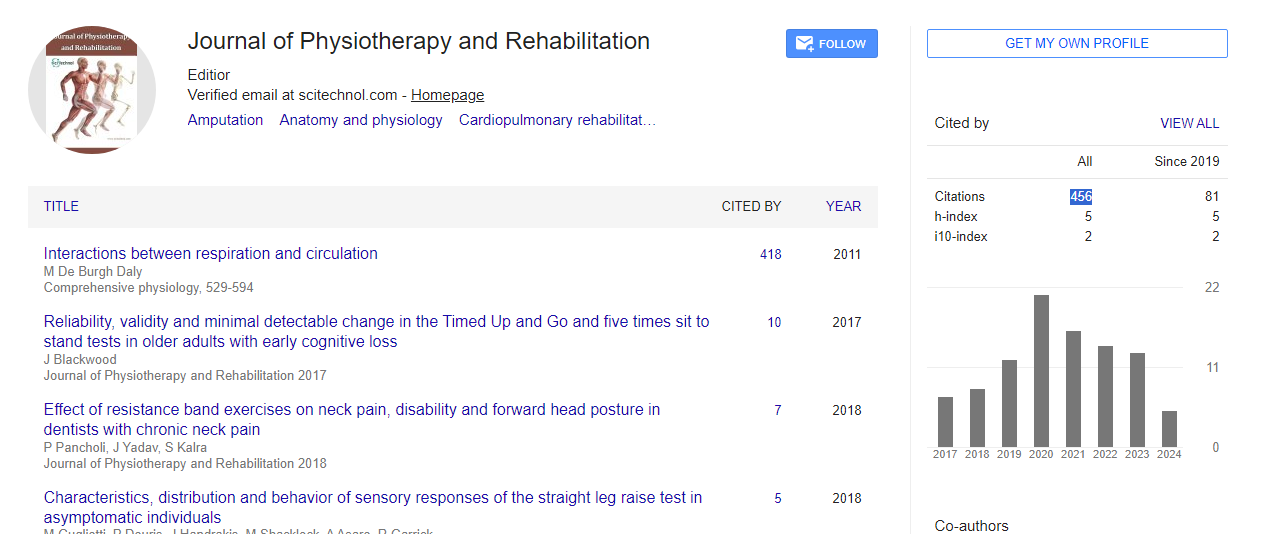Opinion Article, J Physiother Rehabi Vol: 8 Issue: 2
Spina Bifida and Mental Health: Addressing Psychological Needs and Enhancing Flexibility
Wang Qi*
1Department of Physiotherapy, Tarbiat Modares University, Tehran, Iran
*Corresponding Author: Wang Qi,
Department of Physiotherapy, Tarbiat Modares
University, Tehran, Iran
E-mail: qiw@ng.ir
Received date: 27 March, 2024, Manuscript No. JPTR-24-135077
Editor assigned date: 29 March, 2024, PreQC No. JPTR-24-135077 (PQ);
Reviewed date: 12 April, 2024, QC No. JPTR-24-135077
Revised date: 19 April, 2024, Manuscript No. JPTR-24-135077 (R);
Published date: 29 April, 2024, DOI: 10.4172/JPTR.1000171.
Citation: Qi W (2024) Spina Bifida and Mental Health: Addressing Psychological Needs and Enhancing Flexibility. J Physiother Rehab 8:2.
Description
Spina bifida is a congenital condition characterized by incomplete closure of the spinal cord and surrounding vertebrae during fetal development. While physical challenges are often the primary focus of management, the impact of spina bifida on mental health and wellbeing should not be overlooked. Individuals living with spina bifida may face a range of psychological and emotional challenges, including stress, anxiety, depression, and adjustment difficulties. In this article, we explore the importance of addressing mental health needs in individuals with spina bifida and strategies for enhancing flexibility and promoting psychological well-being.
Living with spina bifida can pose unique psychological challenges that stem from both the physical aspects of the condition and the social and environmental factors associated with disability. Individuals with spina bifida may experience feelings of grief and loss related to the perceived limitations imposed by their condition, as well as anxiety and uncertainty about the future. Social stigma, discrimination, and accessibility barriers may further exacerbate psychological distress and contribute to feelings of isolation and low self-esteem.
Several mental health conditions are commonly associated with spina bifida, including anxiety disorders, depression, and adjustment disorders. Anxiety may arise from concerns about health complications, medical procedures, or social acceptance, while depression may result from feelings of hopelessness, helplessness, or isolation. Adjustment difficulties may occur during transitional periods, such as adolescence or adulthood, as individuals with spina bifida navigate changes in their roles, relationships, and independence.
Untreated mental health issues can significantly impact the overall quality of life for individuals with spina bifida, affecting their emotional well-being, social relationships, and ability to cope with daily challenges. Poor mental health may also exacerbate physical symptoms and increase the risk of secondary complications, such as chronic pain, fatigue, and decreased adherence to medical treatment regimens. Addressing mental health needs is therefore essential for optimizing outcomes and promoting holistic well-being in individuals with spina bifida.
Effective management of mental health in individuals with spina bifida requires a multidisciplinary approach that addresses both psychological and environmental factors. Psychosocial support services, such as counseling, psychotherapy, and support groups, can provide individuals with spina bifida and their families with a safe space to express emotions, learn coping strategies, and access practical resources. Cognitive-behavioral therapy (CBT) and mindfulness-based interventions may be particularly beneficial for managing anxiety, depression, and stress.
In addition to individual therapy, family counseling and education are essential components of mental health support for individuals with spina bifida. Family members play a critical role in providing emotional support, promoting independence, and advocating for the needs of their loved ones. Education about spina bifida and its impact on mental health can help families better understand and address the challenges faced by their loved ones, fostering empathy, communication, and flexibility within the family unit.
Building flexibility is key to managing the psychological impact of spina bifida and overcoming adversity. Flexibility refers to the ability to adapt and bounce back from challenges, setbacks, and stressors. Encouraging individuals with spina bifida to develop coping skills, cultivate social support networks, and engage in meaningful activities can help build flexibility and enhance overall well-being. Setting realistic goals, celebrating achievements, and caring for a sense of empowerment and self-efficacy are also important aspects of flexibility-building.
Lastly, promoting inclusive and supportive environments is essential for ensuring the psychological well-being of individuals with spina bifida. This includes advocating for accessibility, inclusion, and equal opportunities in education, employment, healthcare, and community settings. By attending a culture of acceptance, diversity, and respect, we can create environments where individuals with spina bifida feel valued, empowered, and able to thrive.
Conclusion
Addressing the psychological needs of individuals with spina bifida is essential for promoting comprehensive well-being and optimizing outcomes. By providing comprehensive mental health support, caring for flexibility, and creating inclusive environments, we can help individuals with spina bifida live fulfilling, meaningful lives despite the challenges they may face. Through collaboration, education, and advocacy, we can build a more supportive and inclusive society where all individuals, regardless of ability, can flourish.
 Spanish
Spanish  Chinese
Chinese  Russian
Russian  German
German  French
French  Japanese
Japanese  Portuguese
Portuguese  Hindi
Hindi 